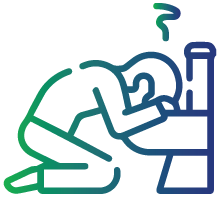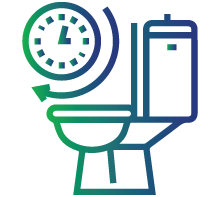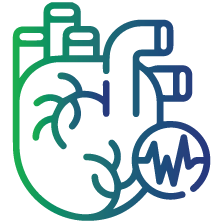
B-Type Natriuretic Peptide (BNP)
B-Type Natriuretic Peptide (BNP)
The B-type natriuretic peptide test measures brain natriuretic peptide (BNP) levels, a hormone released by the heart in response to increased stretching of the heart muscle cells.
If the levels of BNP in your blood exceed the normal range, it could be a sign of impaired cardiac function. This could imply that your heart is not efficiently pumping sufficient blood throughout your body. Furthermore, since BNP is eliminated by the kidneys, it could also indicate potential kidney dysfunction.
Getting this test done is recommended to aid in the diagnosis and to monitor heart failure and other cardiac conditions
Symptoms of Heart Failure

Shortness of breath

Swelling in your abdomen, feet, legs

Fatigue

Cough

Chest pain

Inability to sleep

Loss of appetite

Nausea and vomiting

Heart palpitations

Confusion

Need to urinate a lot, especially at night
What is the BNP test used for?
A BNP test is performed

As a part of routine health check-ups for individuals who are at a higher risk of developing heart or kidney disease

To confirm heart failure in individuals exhibiting symptoms

To monitor the effectiveness of treatments and interventions aimed at managing heart failure
Test preparation
No special preparation is required for the BNP test
Interpretation of the Test Results
BNP normal levels are less than 100 picograms per milliliter (pg/mL). It is important to note that the level of BNP varies based on your age, sex, medical history, and family history. Please discuss the test results with your healthcare provider.
Deviation from normal levels indicates the following:
- Higher than normal levels of BNP indicate that your symptoms are due to heart failure, your healthcare provider may order additional tests to confirm the diagnosis.
Lower than normal levels of BNP indicate that your symptoms are not due to heart failure
FAQs
What happens during the BNP test?
During the BNP test, a healthcare professional will take a small amount of blood from a vein in your arm using a small needle, which is collected in a test tube or vial. This procedure is usually completed within a few minutes
What are the risks associated with the BNP test?
During the BNP blood test, one may experience minor pain or bruising where the needle was inserted, but these discomforts will subside quickly
How long should I wait for my BNP test results?
The BNP test results are available less than 1 hour after sample collection. This duration may vary depending on the diagnostic clinic
What causes elevated levels of BNP other than heart failure?
Elevated BNP levels may also occur in conditions such as kidney disease, pulmonary hypertension, and acute coronary syndrome. Additionally, conditions such as sepsis, myocarditis, and valvular heart diseases can contribute to increased BNP levels
How quickly do BNP levels change during a myocardial infarction (MI)?
BNP levels usually increase rapidly within a few hours and peak within 24 to 48 hours during a myocardial infarction (MI). This rise in BNP is a response to the stress on the heart muscle. Monitoring BNP levels can aid in assessing the severity of the MI and guiding treatment decisions. However, individual variations exist, and healthcare providers use a combination of clinical findings and cardiac biomarkers to provide an accurate diagnosis

